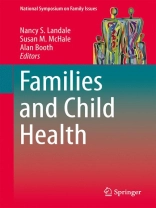In recent years, there has been an explosion of research on the early origins of adult health. A growing body of evidence documents that maternal health before conception, prenatal and perinatal exposures, and conditions in childhood play critical roles in health over the life course. Scientific understanding of the multiple and interacting influences on child health and their role in later health continues to evolve rapidly, but greater attention to how families shape the conditions of early life that underlie childhood health is needed. This volume aims to advance understanding of this topic, with attention to mechanisms through which health disparities emerge and are sustained across the lifespan.
Jadual kandungan
I. Biosocial Influences on Early Childhood Health.- The Developmental Origins of Chronic Disease.- How Can We Overcome the Biological Inertia of Past Deprivation?.- Anthropological Perspectives on the Developmental Origins of Adult Health.- D evelopmental Origins of Disease and Health Disparities: Limitations and Future Directions.- The Effects of Early Severe Psychosocial Deprivation on Children’s Cognitive and Social Development: Lessons from the Bucharest Early Intervention Project.- II. Role of Family Dynamics in children’s Health.- Family Discord and Child Health: An Emotional Security Formulation.- F amily Influences on Children’s Mental and Physical Health: Some Contributions of and Challenges to the Emotional Security Theory.- Emotional Insecurity and Child Health: Implications and Future Directions.- C ould Emotional Security Theory help advance family focused preventive interventions?- III. Link to the Social Environment through Families.- Lifecourse Exposures and Socioeconomic Disparities in Child Health.- Lifecourse Exposures and Socioeconomic Disparities in Child Health: Opportunities for Intervention.- S ocial Class and Child Health: Our Complexity Complex.- IV. Impact of Social Polices & Programs on Children’s Health.- The Pro Family Workplace: Social and Economic Policies and Practices and their Impacts on Child and Family Health.- Work-Family Strain and Health Care for Children.- Harder Than Rocket Science? The Science of Designing and Implementing Strong Family Friendly Policies.- Emerging Evidence from Research that Can Improve Social Policies and Programs to Impact Child Health.- V. Conclusions: Integrating Perspectives on Child Health.
Mengenai Pengarang
Nancy Landale, Ph.D., is Liberal Arts Research Professor of Sociology and Demography at The Pennsylvania State University. Dr. Landale’s areas of interest include family demography, children’s health, immigration and immigrant incorporation, and the Hispanic population. She is widely known for her research on the implications of migration to the U.S. mainland for family processes and maternal/infant health among Puerto Ricans. Her current work focuses on the educational and health outcomes of Mexican children of immigrants.
Susan Mc Hale, Ph.D., is Director of the Social Science Research Institute and The Children, Youth, and Family Consortium and Professor of Human Development at The Pennsylvania State University. Her research focuses on children’s and adolescents’ family roles, relationships, and daily experiences and how these family dynamics are linked to youth development and adjustment.
Alan Booth, Ph.D., is Distinguished Professor of Sociology, Demography, and Human Development & Family Studies at The Pennsylvania State University. He has been a senior scientist in Penn State’s Population Research Institute since 1991. Dr. Booth has co-organized the university’s National Symposium of Family Issues since its inception in 1993. He is the author of more than 100 scholarly articles, four books, and editor of 16 volumes. He was editor of Journal of Marriage and The Family from 1985-1991. Dr. Booth directed a 20 year study of marital instability in a national sample of 2000 married persons. The project has been the basis for many studies on the causes of divorce, the effects of divorce on children’s well-being, remarriage and step families, as well as the effects on psychological distress, educational achievement, romantic relationships and family formation of having a non-resident parent.












